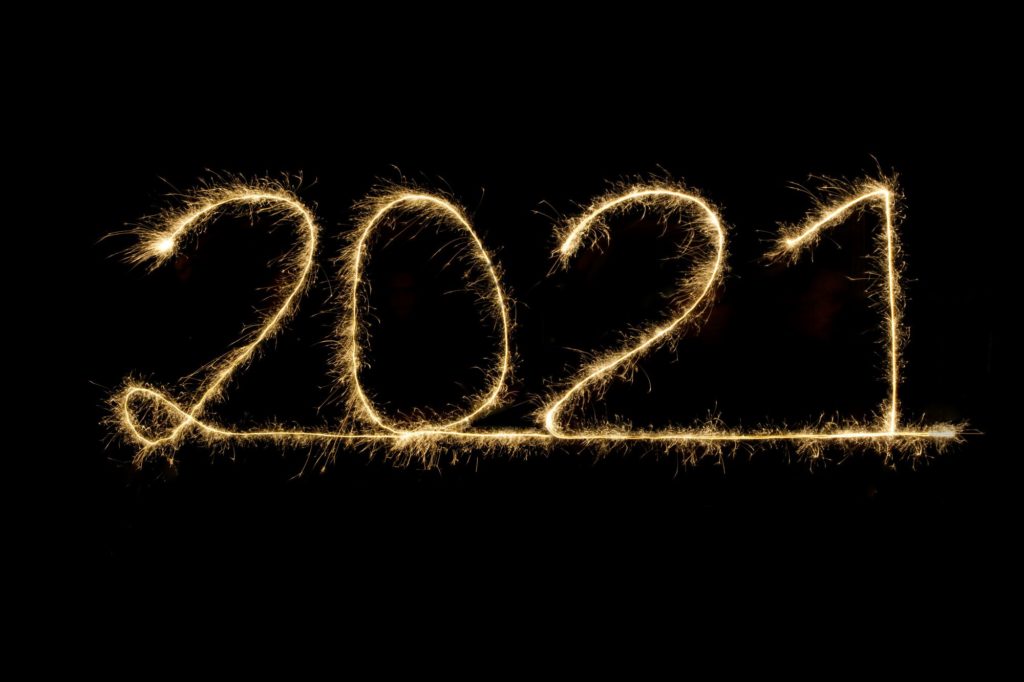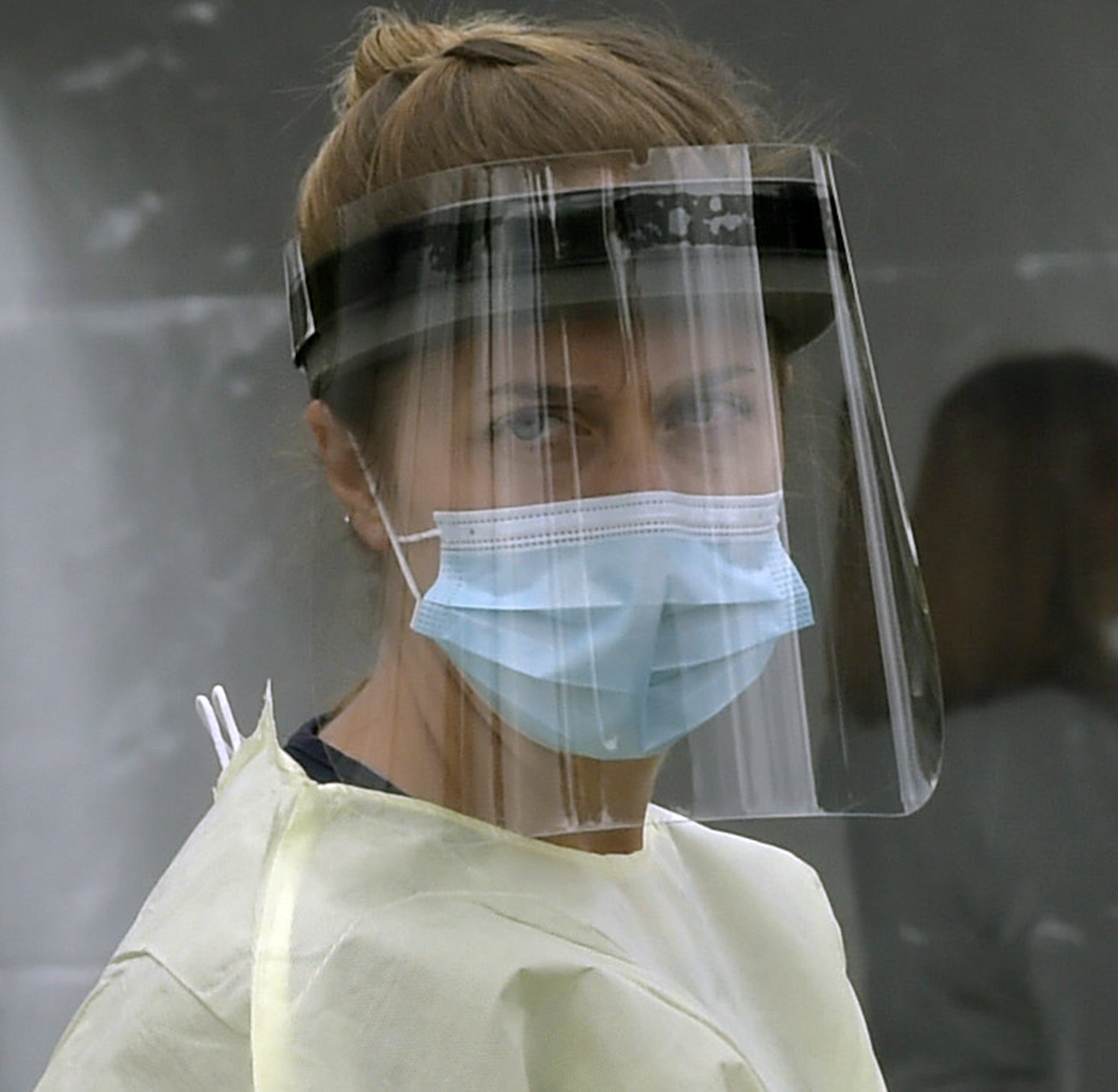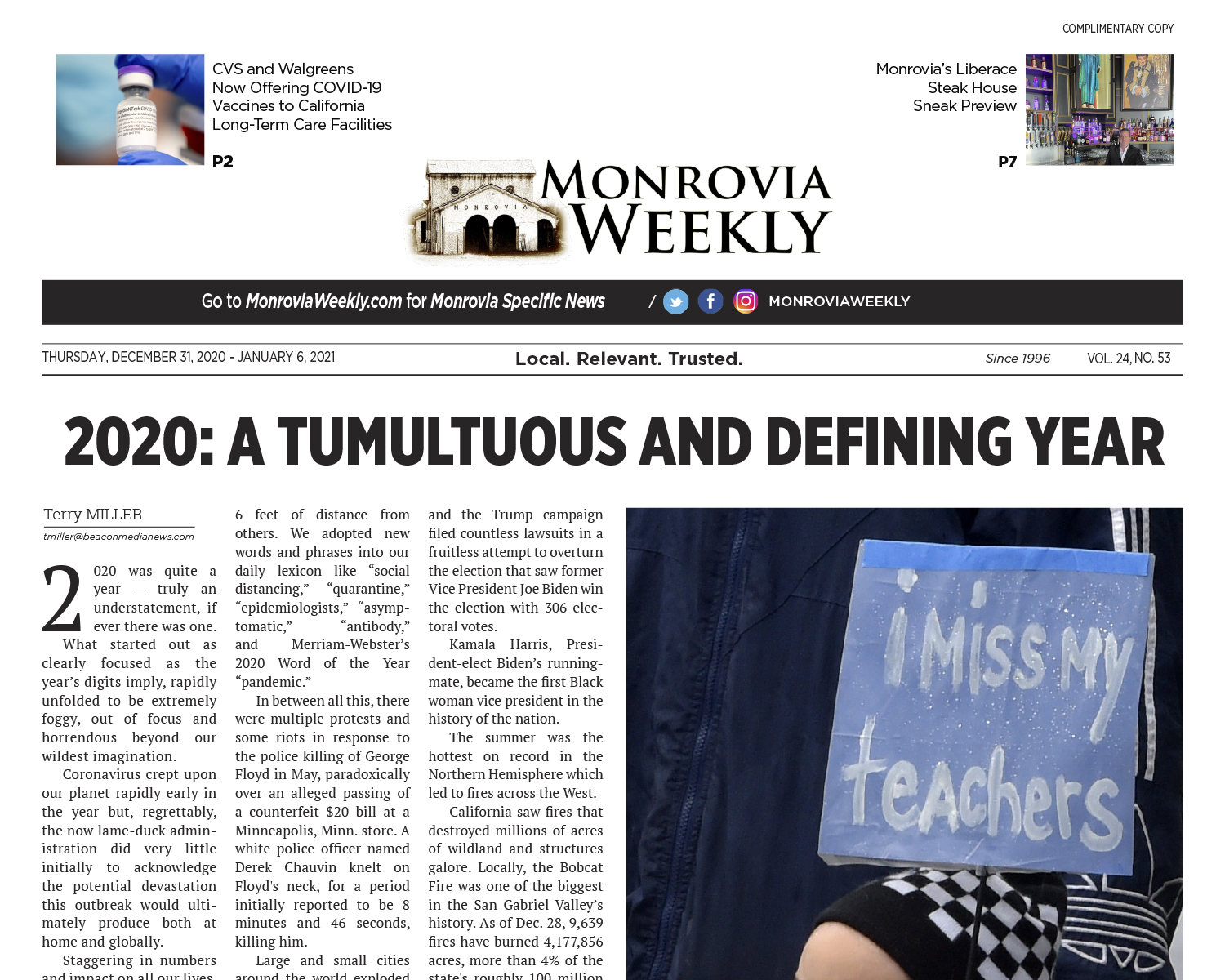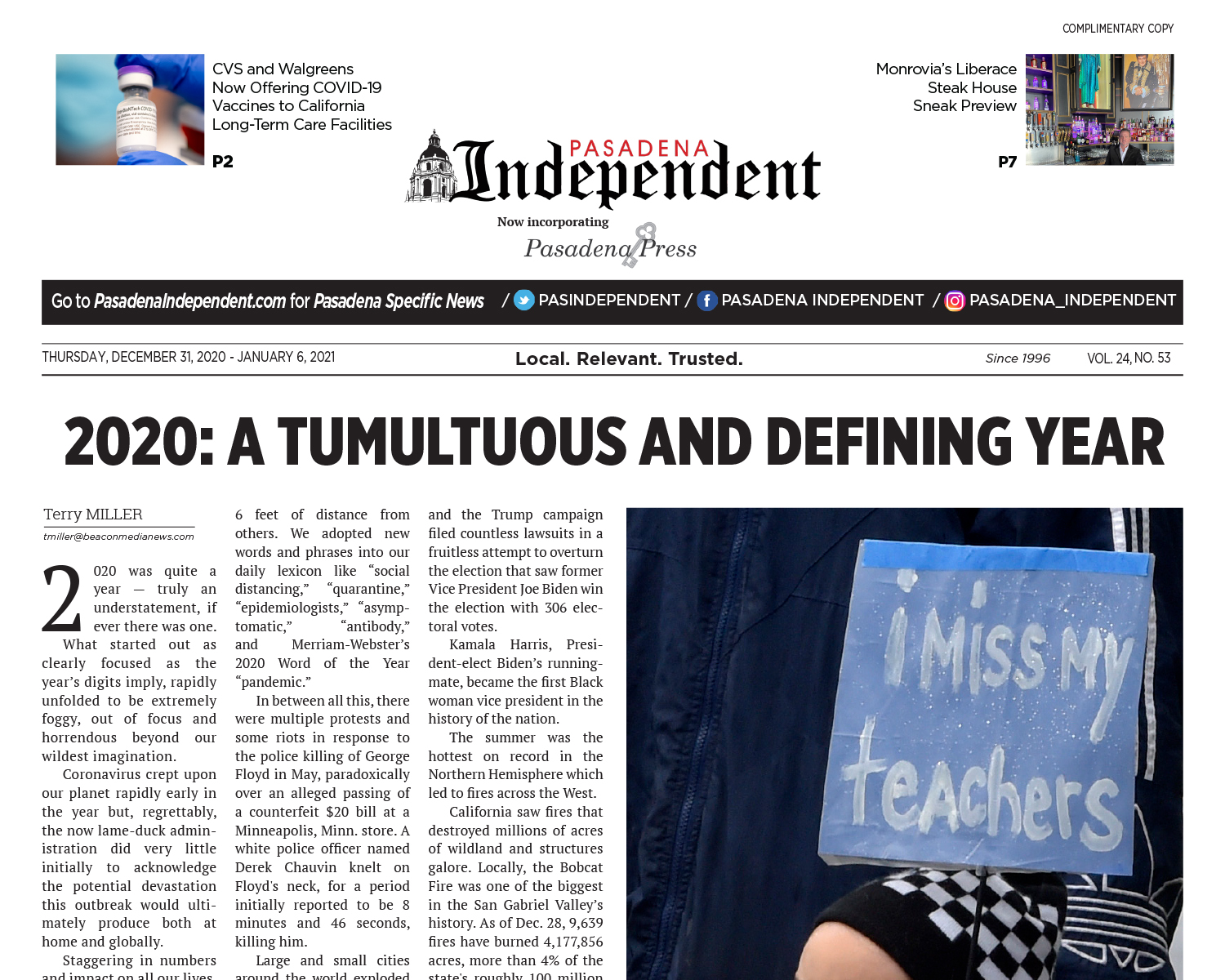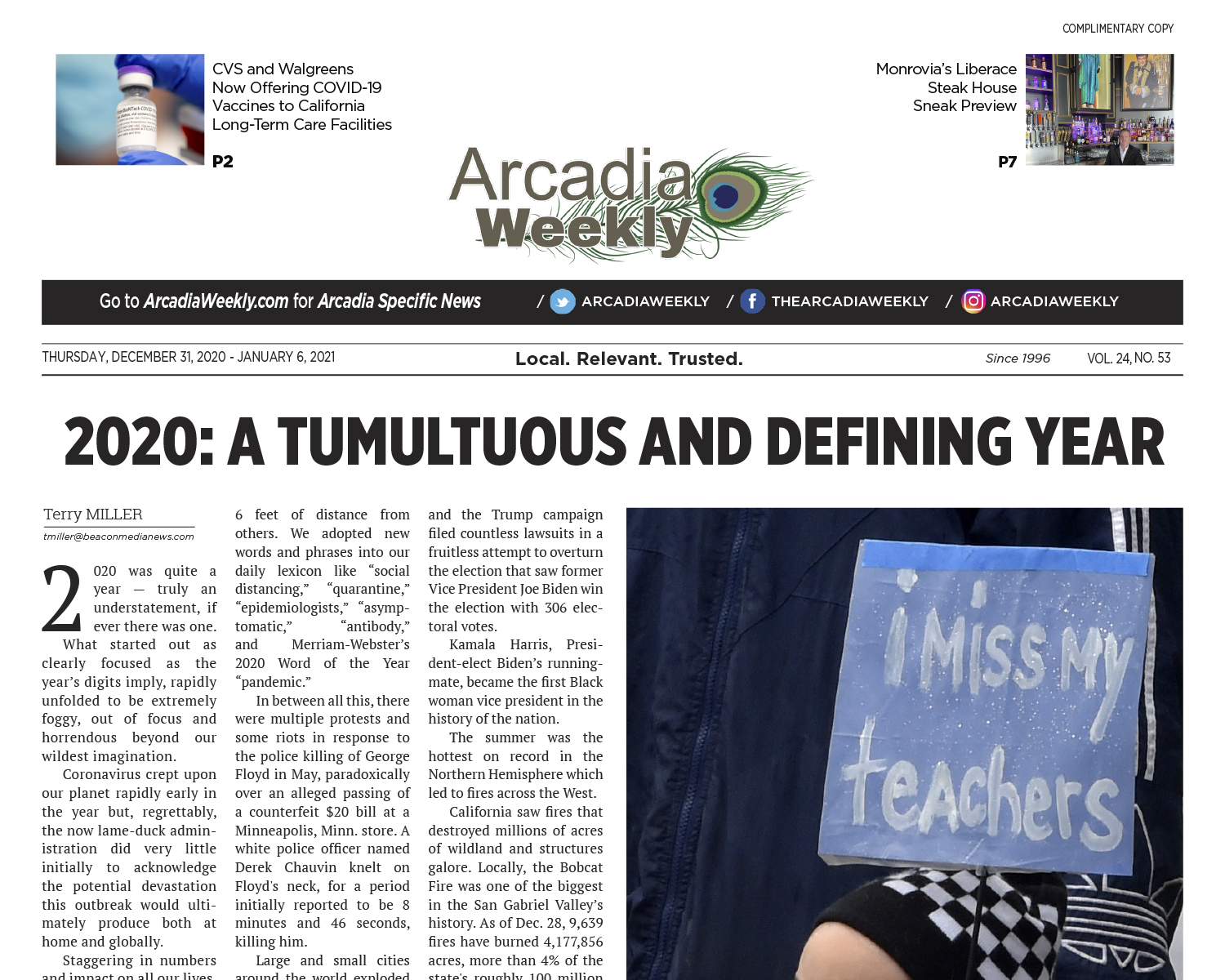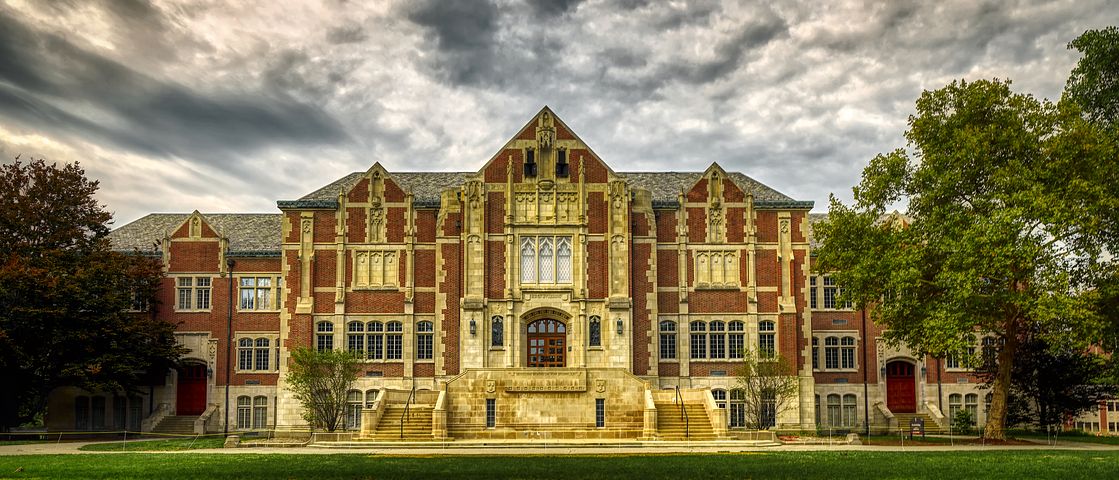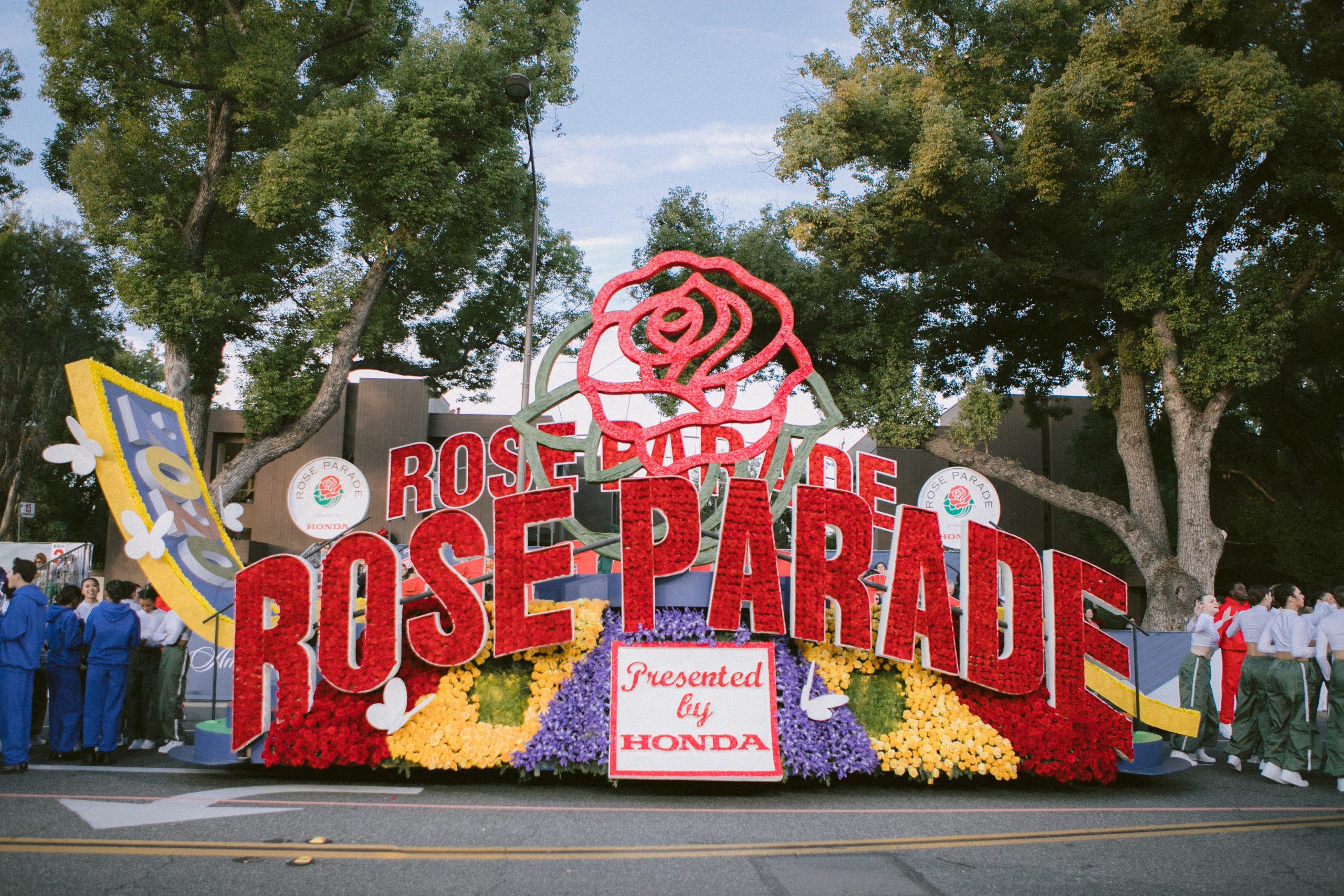
By May S. Ruiz
To say that these are extraordinary times might be an understatement to describe a year beset by an astounding 81 million infections and over 1.7 million deaths from COVID-19 worldwide. In the face of those sobering statistics, a New Year’s Day without a Rose Parade or Rose Bowl Game in Pasadena seems trifling.
However, the Tournament of Roses Association (TofR) is determined to use that day — when we’re usually glued to our television sets marveling at the magnificent floats, watching the spectacular equestrians, and delighting in the marching bands as they travel five miles on Colorado Boulevard — to showcase and honor our New Year’s Day traditions.
This New Year’s Day presentation isn’t all about entertainment though. TofR President Dr. Robert Miller states, “We’re producing ‘Rose Parade New Year’s Celebration Presented by Honda,’ in partnership with Feeding America®, the nation’s largest organization dedicated to fighting domestic hunger through a nationwide network of food banks. Food insecurity has been a focus of our organization’s efforts during the pandemic, so it was only fitting for us to extend that commitment to our TV special. We’re very happy to have this opportunity to work with Feeding America, an organization that’s working to change lives in communities across the country.”
“When we were envisioning what this was, we asked ‘What do we want this show to feature?'” Dr. Miller continues. “Words like ‘new beginnings,’ ‘current issues,’ ‘moving forward,’ ‘honoring first responders,’ ‘optimism,’ ‘football,’ ‘ celebration,’ came to mind. It’s a fully-produced, two-hours of engaging, interactive broadcast about everything Rose Parade — our history; volunteers; parade participants, including bands, equestrians; and all the beautiful flowers. We’ll have celebrity performers in the fields of music, film, and television, as well as culinary and sports personalities.”
According to a press statement released by TofR, “The re-imagined New Year’s Day celebration will feature stellar musical entertainment and exciting celebrity guest appearances that will appeal to fans of country music, television, Broadway, and sports. There’s something for everyone in the family to enjoy. Musical performers include: Sheryl Crow, nine-time GRAMMY® Award winner with more than 50 million albums sold; Mickey Guyton, country singer-songwriter and historic GRAMMY® award nominee; Tori Kelly, multi-GRAMMY® Award winner, singer-songwriter; Lady A, multi-platinum, seven-time GRAMMY® Award-winning country trio Rascal Flatts — the most awarded country group of the last decade; The War and Treaty, eclectic, soulful, husband-and-wife duo – one of Nashville’s breakout acts.
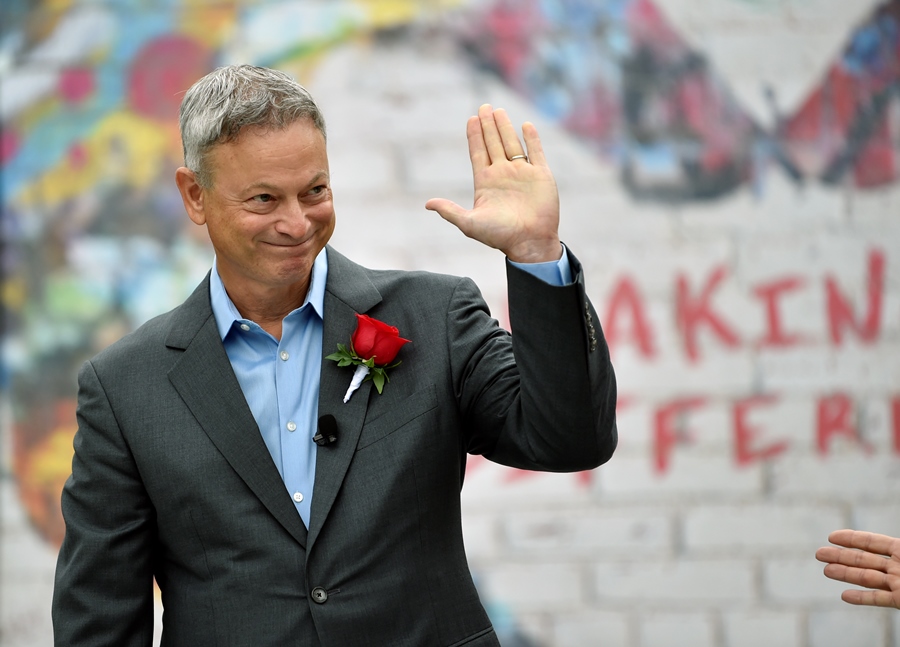
“There will be celebrity guest appearances by: Daddy Yankee – multi award-winning singer; songwriter, actor and producer Shanola Hampton – star of ‘Shameless’ on Showtime; Laurie Hernandez – Olympic gold and silver medalist, 2016 U.S. Olympic Women’s Gymnastics Team; Emeril Lagasse – chef, restaurateur, TV personality; and author Matt Leinart – 2019 Rose Bowl Hall of Fame inductee, former NFL player and Heisman Trophy winner; Rita Moreno – Emmy®, GRAMMY®, Oscar® and Tony® (EGOT) award winner; Dascha Polanco – star of Netflix hit, ‘Orange is the New Black’; Vin Scully – voice of the Los Angeles Dodgers for more than 65 years; Gary Sinise – actor, philanthropist and 2018 Rose Parade grand marshal. Past Rose Parade grand marshals, Emeril Lagasse and Gary Sinise, will both be featured in the special. Gary will open the show and Emeril will shake us up with his favorite New Year’s Day cocktail.”
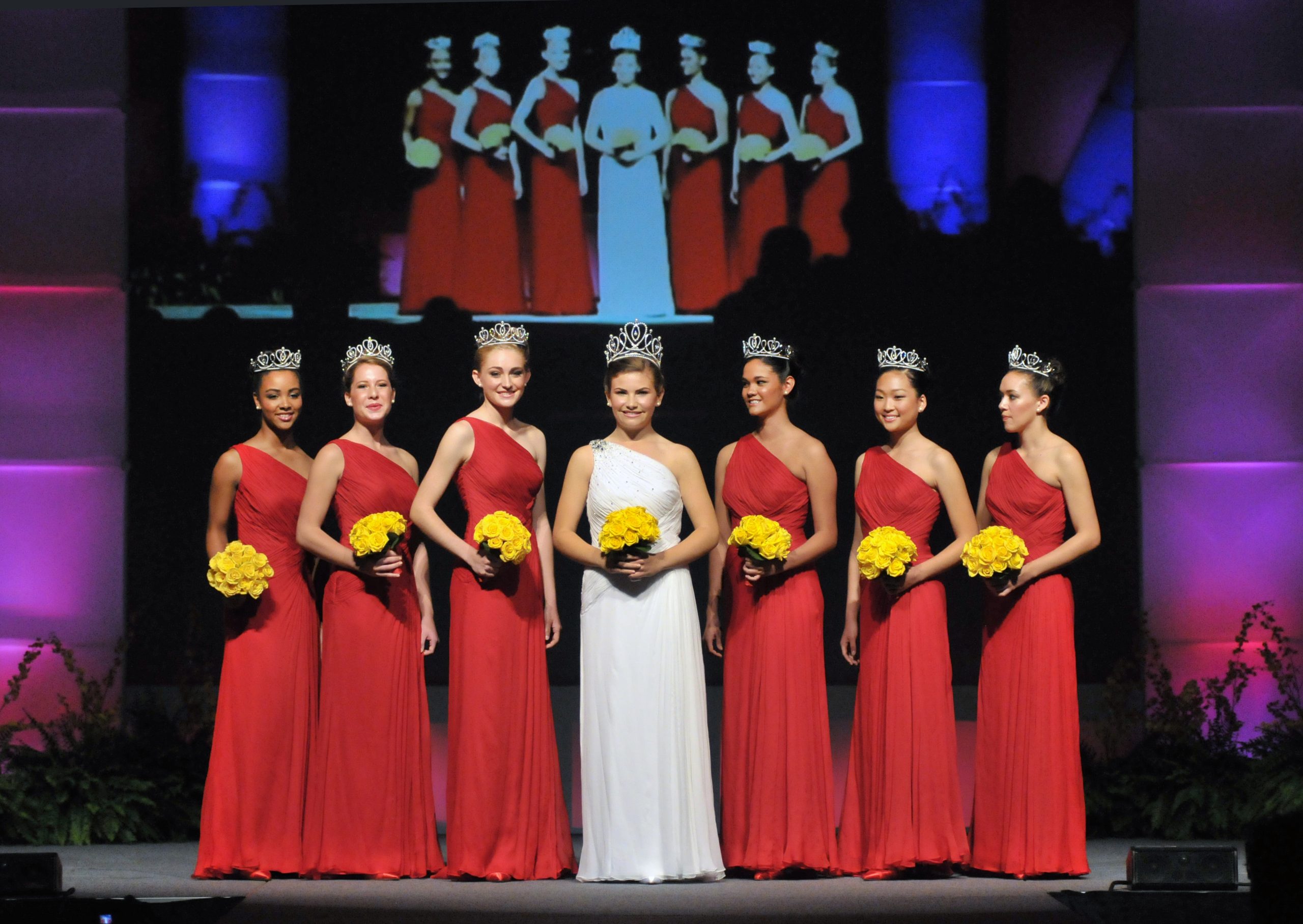
Adds Dr. Miller, “The two-hour special will speak to our Royal Court and their traditions; we’ll share some of our unique moments and lots of heartwarming stories about the TofR members and their activities. We’ll show spectacular floats from previous years, a behind-the-scenes look into building a parade float, and New Year’s wishes from fans around the globe. And, of course, it will talk about football — we’ll have Rose Bowl Game® football highlights. The show will air on ABC, Hallmark Channel, KTLA, NBC and RFD-TV at 8 a.m. PST and on Univision at 7 a.m. PST on Jan. 1. We limited travel and ensured the safety of our talent by having the performance segments filmed at iconic locations around the country — including the Grand Ole Opry and the Rose Bowl Stadium — using the strictest COVID-19 safety protocols.”
The TV special will also include a virtual performance of “Everything’s Coming Up Roses” by seniors in high school from bands across the country to be led by a surprise conductor. Explains Dr. Miller, “While we have invited all the bands who were scheduled to perform in this year’s parade to instead join us for the 2022 Rose Parade, we realize that there are many seniors who will graduate before that. We didn’t want them to miss out on this opportunity, so we’re giving them their very own, unique performance spotlight.
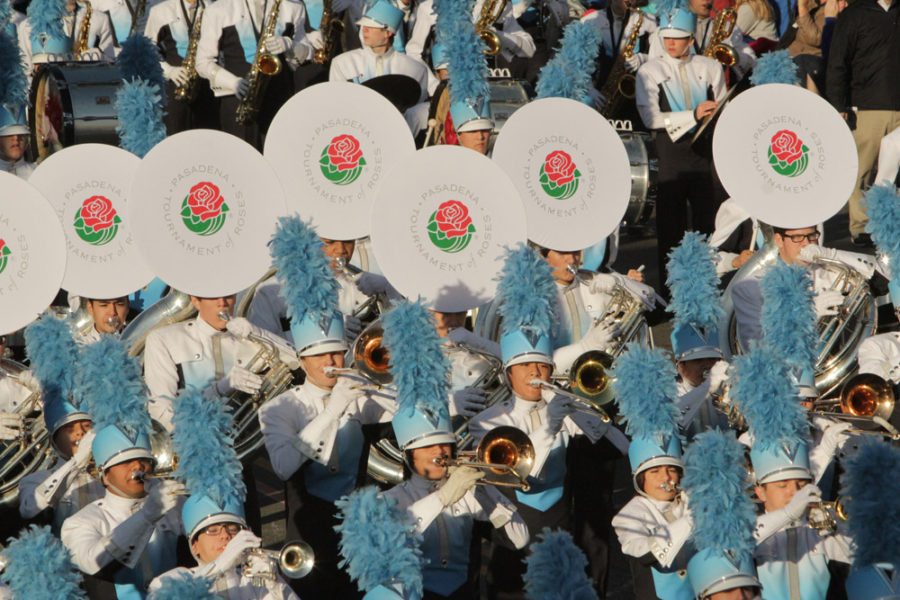
“We’re very excited about this retrospect and a look at America’s New Year celebration — the Rose Parade. All the networks are happy to broadcast the program and we’re grateful to them for airing it. It is our gift to the country and to the world. We want to convey the message that the view of our parade may look very different this year but our mission never changes — to provide the world the best floral parade, to create an enjoyable entertainment event, and to make those accessible to everyone.”
In previous years, the floats were available for public viewing directly after the parade and the following day at Victory Park. When TofR announced in July that they would not be able to host a parade on New Year’s Day, the board sat down to figure out if they could have some floral art displays instead.
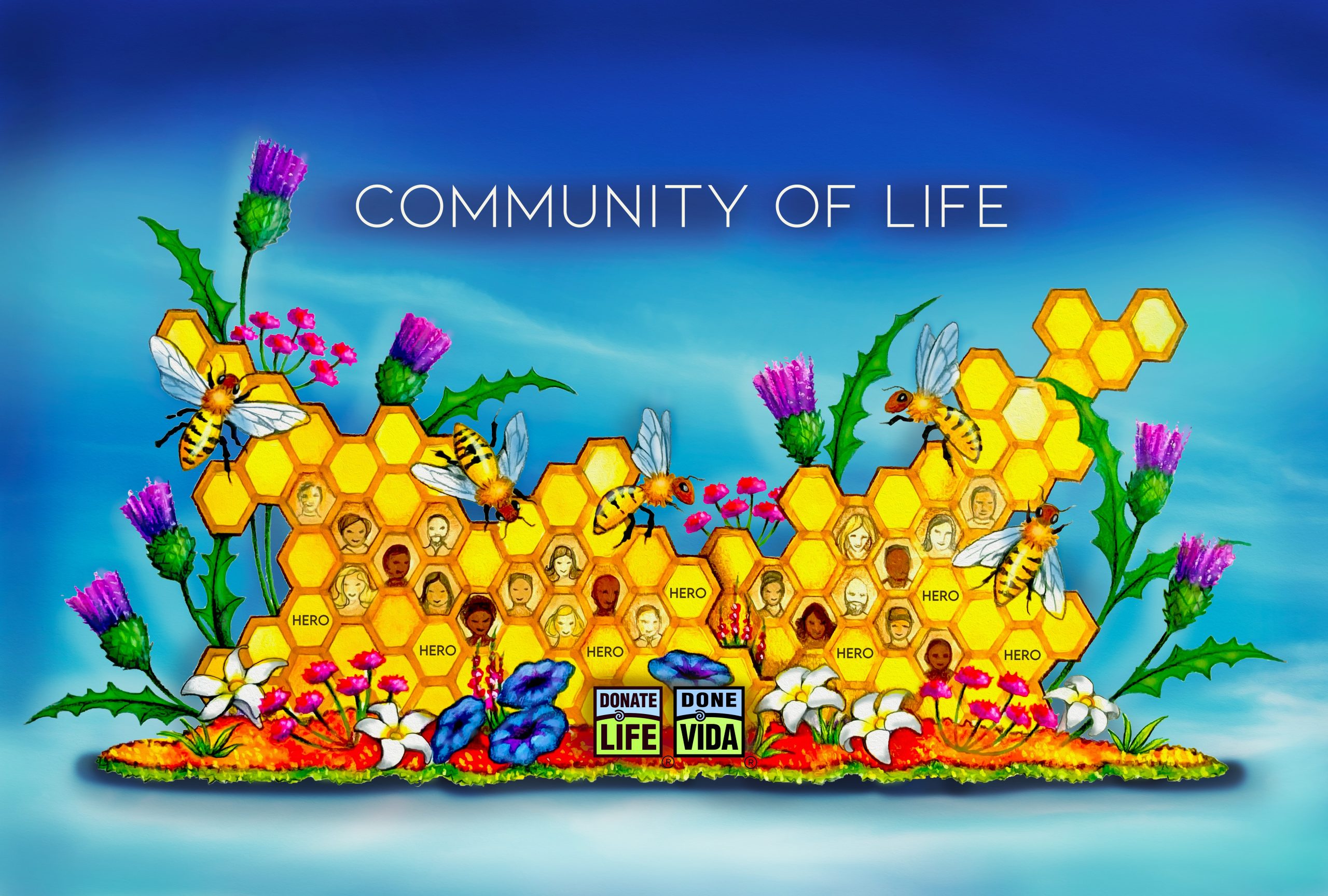
Dr. Miller expounds, “We thought about having drive-by floral installations sponsored by companies. But in order for it to be economically feasible, we needed anywhere from 15 to 20 participants. We were able to get seven or eight committed, but we realized that wouldn’t be enough to make it work so we informed them of our decision to scrap the plan. (As a side note, the idea sounds great, so we might do it another year as a spring or summer event.) However, Donate Life, an organization which has been a Rose Parade participant for several years, came back to us because they liked the concept and thought it would be a way for them to continue promoting the importance of organ, eye, and tissue donation — the need for donors doesn’t stop during the pandemic.”
A press release issued by TofR states, “The Donate Life Rose Parade® float has inspired people across the country and around the world to save and heal lives through the powerful message of organ, eye, and tissue donation since its first participation in 2004. On its 18th year, and as a tribute to17 years on the Rose Parade®, the Donate Life community commissioned a beautiful and symbolic floral sculpture that will be featured in the Tournament of Roses’ TV special and then installed at the Tournament House at the end of December.”
Donate Life’s floral sculpture was created by Fiesta Parade Floats (FPF) at its 70,000-square-foot facility in Irwindale. Established in 1988, it is the longest-tenured Rose Parade float builder and has boasting rights to having the most awards in the float building industry. Its float for The UPS Store’s entry “Stories Change the World” won the 2020 Sweepstakes Trophy.
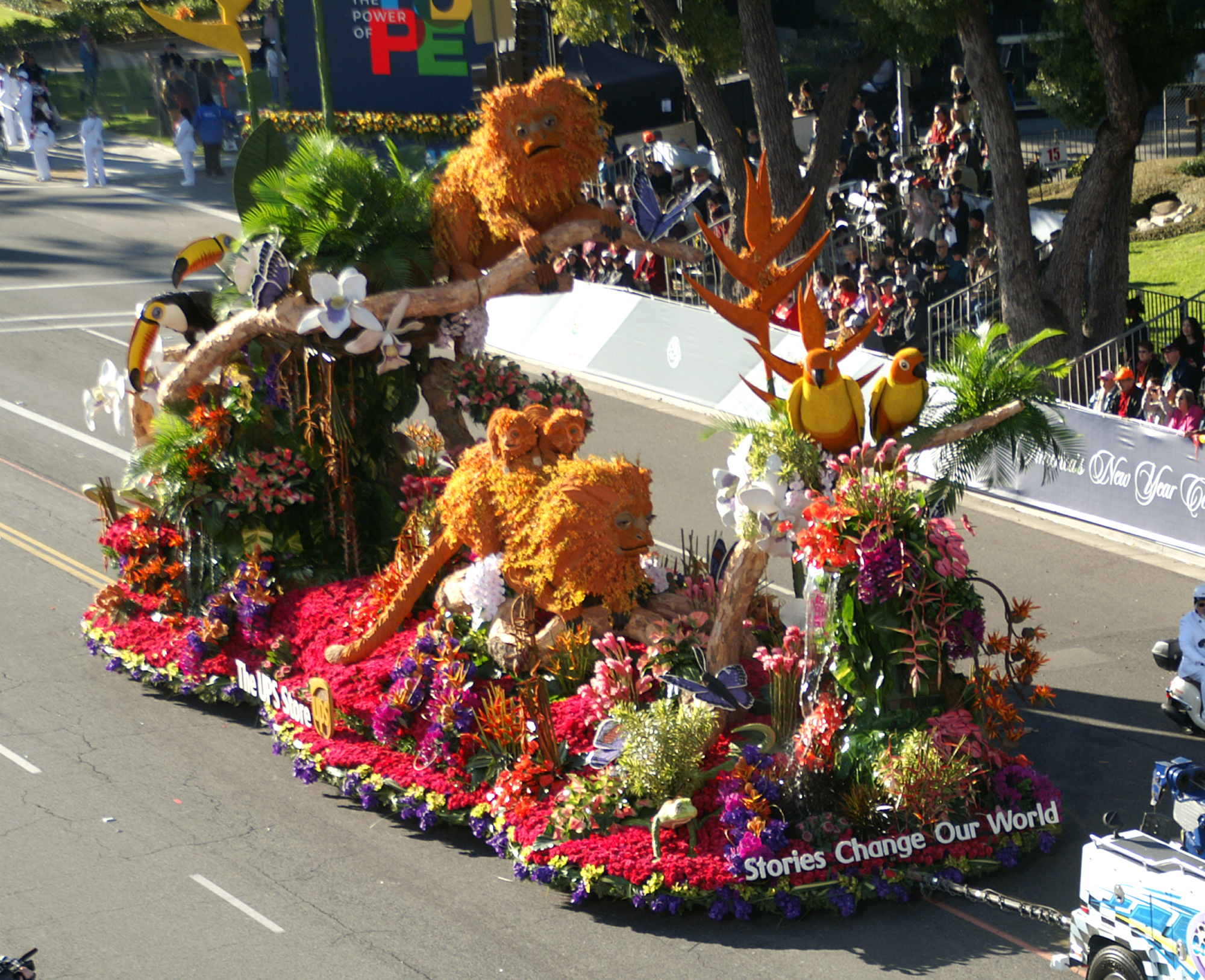
Relates Mark Havenner, Fiesta Float Parade’s spokesman, “Our company started in January of 1988, with its first Rose Parade being the 1989 Rose Parade. On a normal year we produce anywhere from 12-14 Rose Parade Floats. We have been Donate Life’s float builder for the last few years and we’re honored that they wanted us to create this special display. Working directly with Donate Life, award-winning float designer Charles Meier conceived the floral sculpture called ‘Community of Life.’”
Featuring a vibrant honeycomb built by bees, Donate Life’s floral sculpture illustrates that we are stronger when we work together as a community. In the honeycomb are 21 hexagonal memorial portraits, depicting the life that donors bequeath. Additionally, the names of six health professionals — Donation Healthcare Heroes — who have gone above and beyond the scope of duty to make donation and transplantation possible during the pandemic are inscribed on plaques. Hundreds of individually dedicated roses within two beautiful bushes contain personal messages of gratitude, hope, love, and remembrance from the families of donor recipients. Astromerias of various colors are also used in the floral garden.
“In mid-September Fiesta Parade Floats started work on Donate Life’s floral sculpture, which measures approximately 30 feet wide and 15 feet high,” says Havenner. “Twelve people worked on building it and an additional 14 were involved with the decoration process. It will be on display from Dec. 30 through Jan. 3.”
Numerous small enterprises have been adversely affected by the pandemic and, in the Pasadena area, float builders count among them. Havenner discloses, “With the cancellation of the Rose Parade and other projects Fiesta normally works on, we have lost approximately 99% of our yearly business. Fiesta Parade Floats is hoping that all moves forward with the Tournament of Roses and its Jan. 1, 2022 Rose Parade.”
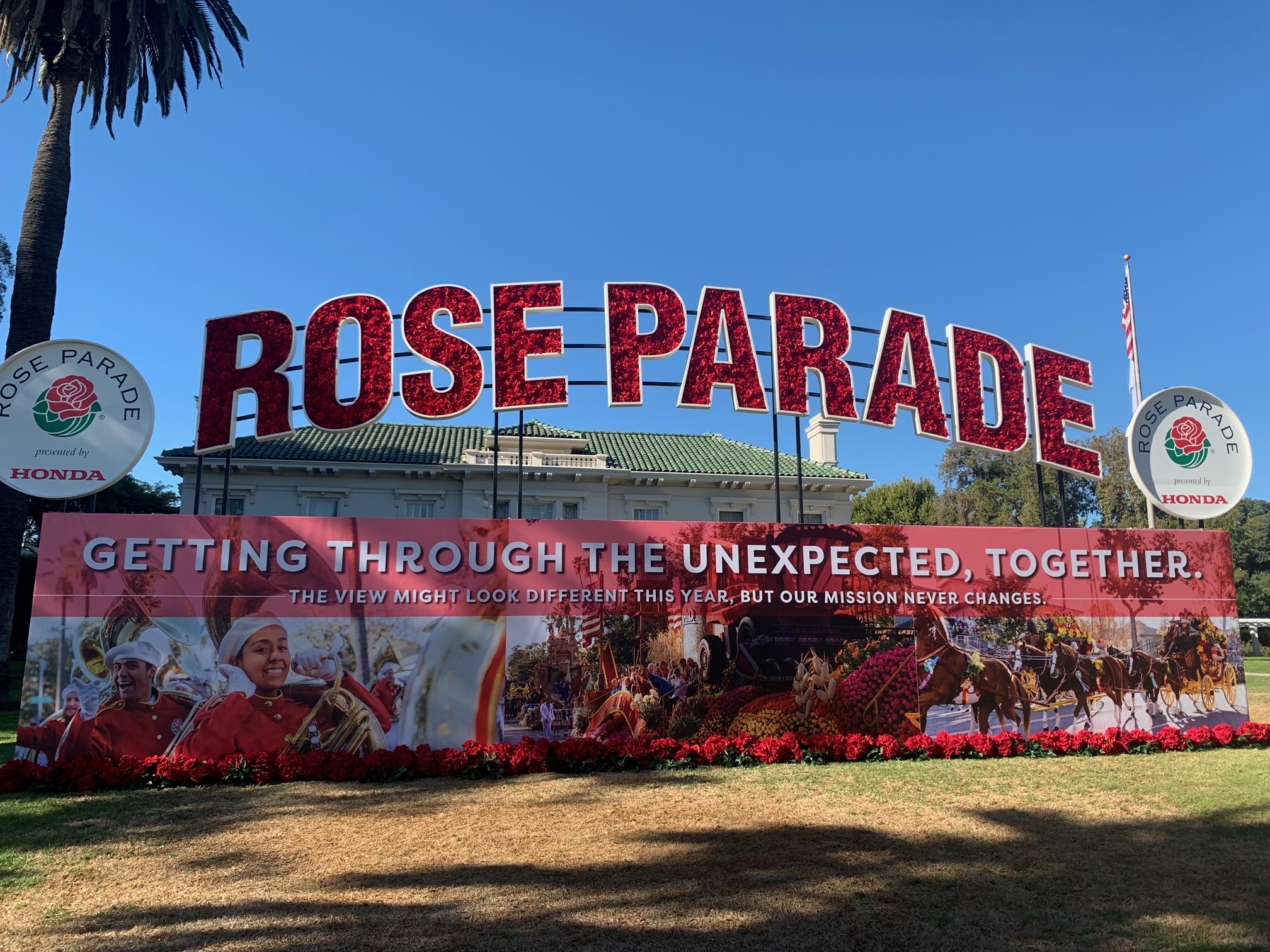
A 40-foot canvas in front of Tournament House reiterates that sentiment. It says “Getting Through the Unexpected, Together. The view of our parade might look very different this year, but our mission never changes.” On it are photos of bands, floats, and equestrians — the Rose Parade’s three major hallmarks. And according to Dr. Miller, already people are stopping, looking, and taking pictures. As he articulates it, “It basically says ‘We didn’t go anywhere. This pandemic hasn’t beaten us, we’re going to be back.’”
During pre-pandemic times, the Tournament president spends a whirlwind year traveling across and out of the country to be the face of the organization. In fact, it’s almost a full-time job that at the end of 2019 Dr. Miller decided to retire from his post at the Los Angeles Community College District as vice chancellor of financial resources, where he spent the last four years of his 37- year career in academia, so he could give it all his time and complete dedication.
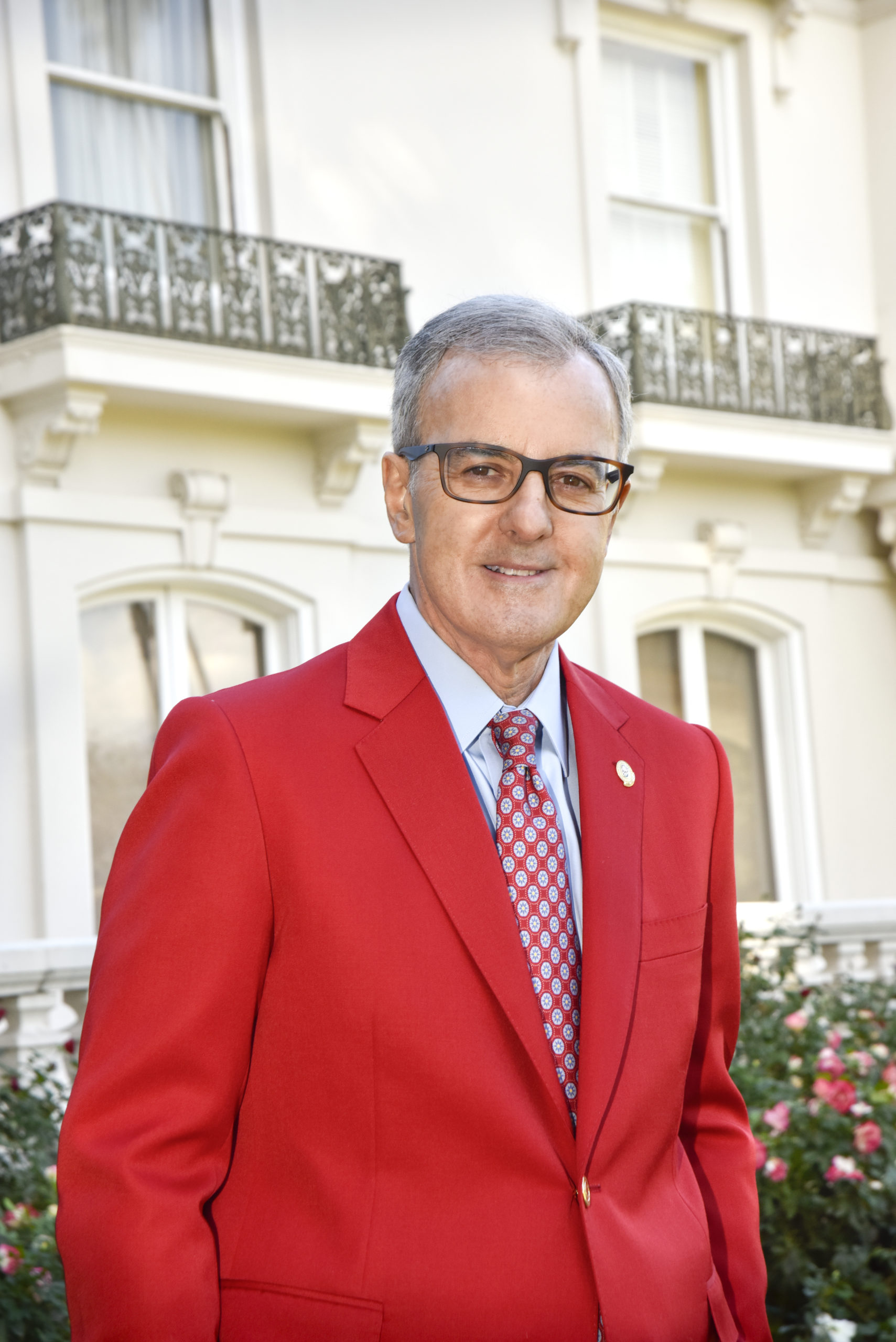
Dr. Miller describes, “The president is the ambassador-in-chief and our job is to go out into the community — locally and regionally throughout the country, and between three to five internationally — and help with fundraising. That includes meeting with major sponsors, appearing at banquets, kissing babies, and whatever it takes to help them raise the money to be able to come to Pasadena. Getting a band to Pasadena, for example, is typically a $2,000 to $2,500 expense per band participant. So we’re looking at anywhere from $400,000 to $1 million just to get a band to Pasadena — that’s a lot of bake sale and car wash fund raising. I have been a TofR member for 37 years and it’s a true honor and pleasure to get to this point.”
This has been a vastly different year, though, and none of what Dr. Miller prepared decades for transpired. However, much like other major festivals, TofR’s board of directors decided that all of 2020-2021 assignments would be the same in 2021-2022. Therefore, Dr. Miller will be president again and will have the opportunity to do what other presidents before him had done. His theme “Dream, Believe, Achieve” will return next year.
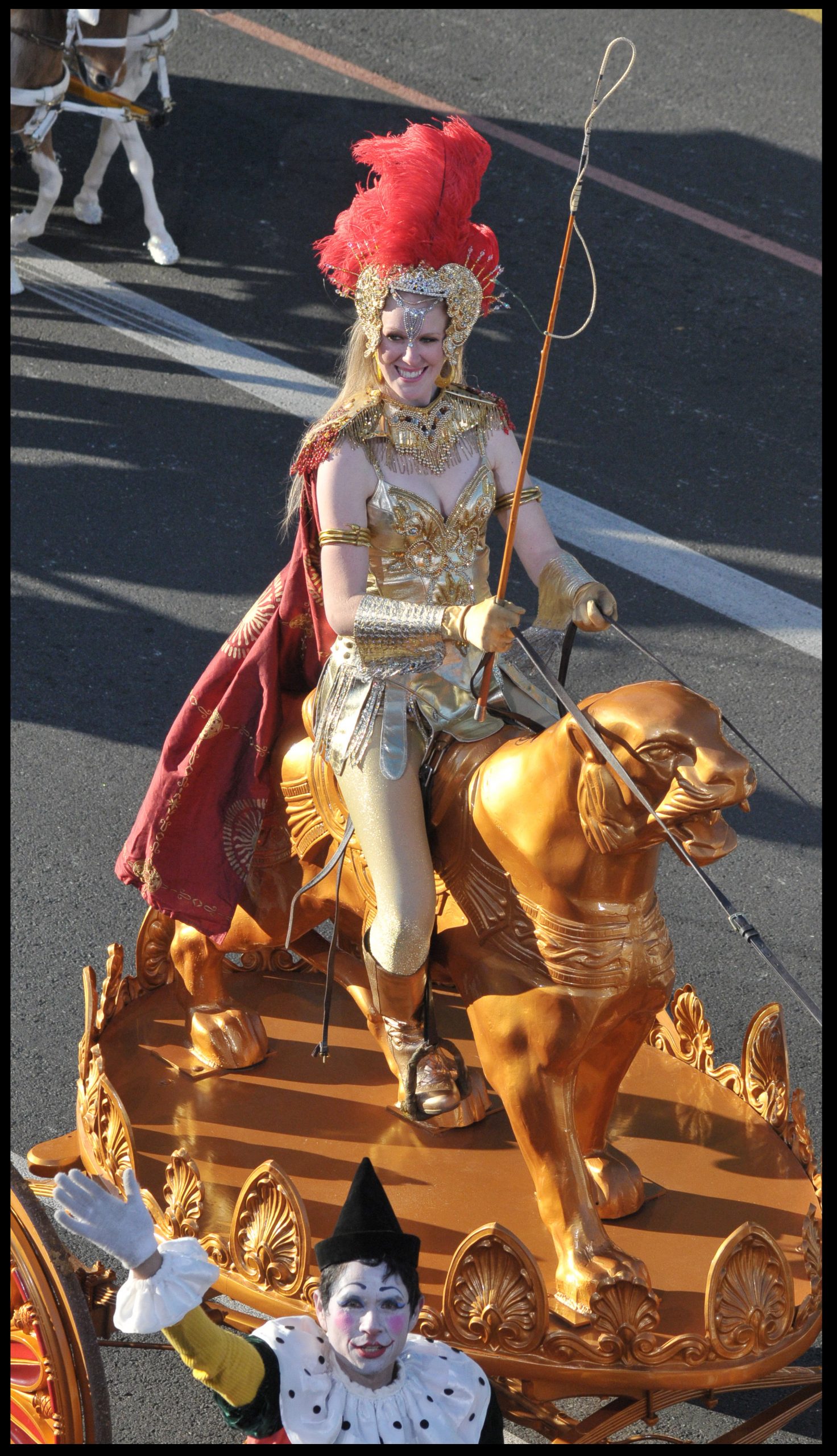
Dr. Miller’s professional experience as a community college administrator — he spent 22 years at Pasadena City College as associate superintendent and senior vice-president for business and college services, which was essentially like being a chief financial officer; he was interim superintendent president for about 15 months — served him well in this challenging year.
“All that administrative experience and business knowledge and acumen came in handy in working through the myriad issues — cancelling the parade and the impact of that decision on everyone from parade participants, to vendors, major suppliers, sponsors, partners,” expresses Dr. Miller. “I was heavily engaged starting the end of March through Aug. 1, figuring out the business aspect. For example, we had to take this year’s operating budget from roughly $16 million to just under $6 million. That was difficult enough, but then we had to look at every one of our relationships and determine the impact on that and work with these entities to limit the damage. We determined we had to make a decision in early July if we wanted to cancel the parade because of the investments and contractual commitments these entities — our float builders, bands, co-sponsors — had to make. That kept me busy 10 to12 hours a day.
“The TofR Foundation, which has been in operation, I’m guessing probably in the 1980s, has given almost $4 million to the local community and we’re working to give more. It’s a business and this year it was all about sustaining under these terms. My number one goal was to maintain as strong a balance sheet as we could and keeping as much reserves as we could to make sure this parade and game will be here for another 132 years. There’s no doubt that it has been a very different experience. We all have our journeys in life — I happen to be one who believes everything happens for a reason and, as fate would have it, I was the president during this horrible pandemic.”
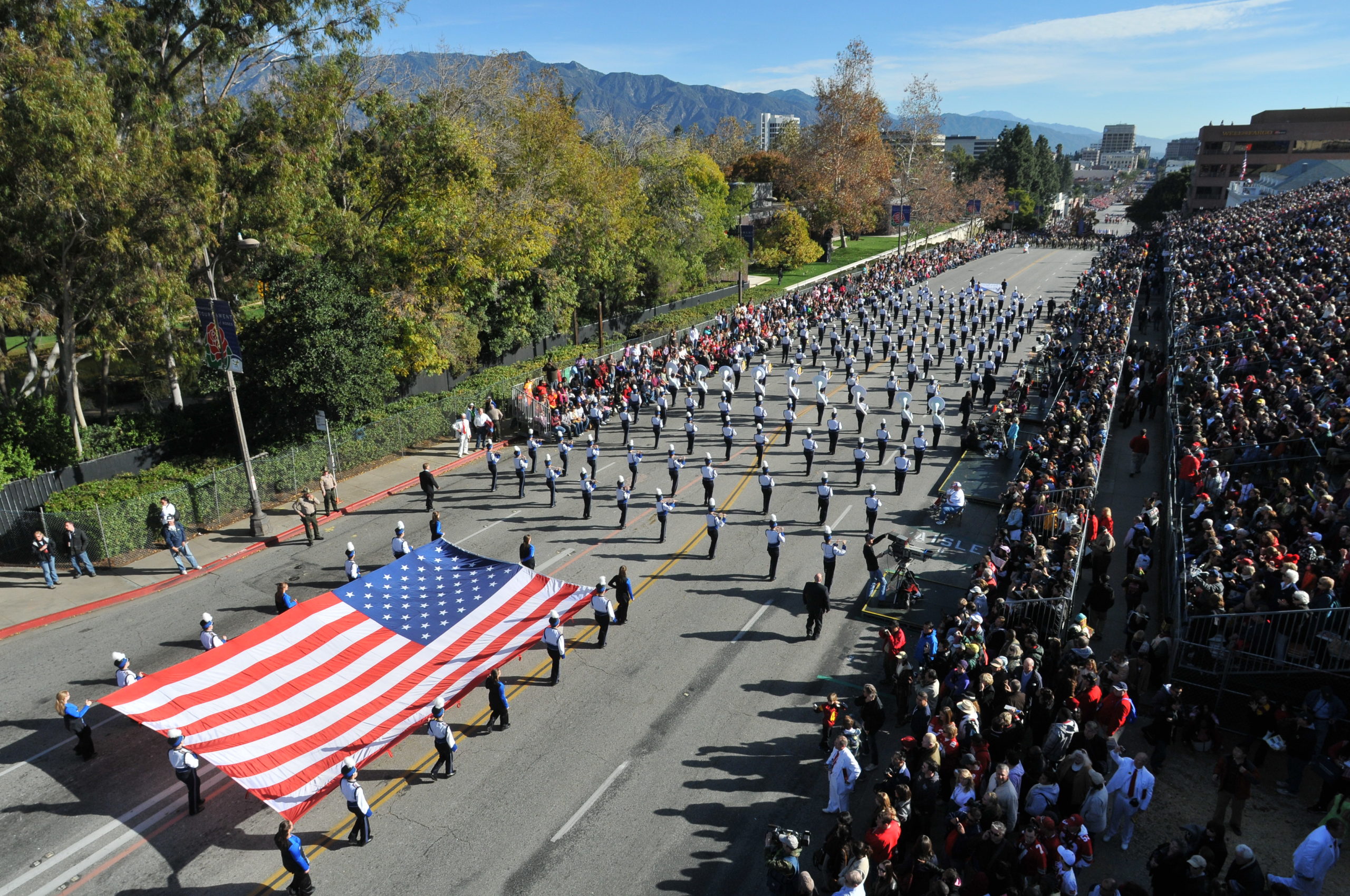
Besides the two-hour television special on New Year’s Day, the CFP semi-finals were originally going to be played at the Rose Bowl that afternoon and then later, at the Sugar Bowl. The winner of the Rose Bowl Game and the winner of the Sugar Bowl will then compete in the 2021 National Championship Game in Miami on Jan. 11 at the Hard Rock Stadium in Miami Gardens, Fla. and will be aired on ESPN.
TofR devised a schedule and set of activities in compliance with COVID-19 protocol. They would create a bubble environment necessary to ensure the health and safety of the players, coaches, and athletic staff, the vendors, and the media — from where they would be staying during their three days’ stay, to where they would be eating (the traditional Lawry’s dinner was cancelled), to where they would practice.
Because L.A. County had a surge of coronavirus outbreak, state health officials did not approve Rose Bowl representatives’ appeal to allow 400 to 500 people in the 90,888-seat stadium. So the plan was for the teams to play at 2 p.m. without spectators. According to a sports article in the Pasadena Star-News, though, Clemson’s coach Dabo Swinney said it made no sense to fly his players all the way to California to play to an empty stadium. Furthermore, “before losing to Clemson, Notre Dame coach Brian Kelly went so far as saying that his team might boycott the game if families were not allowed to attend.”
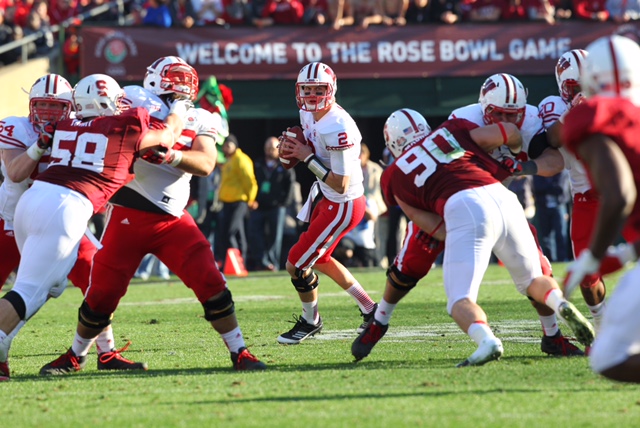
In the end, it was announced that the playoff between Clemson and Ohio State would be held at the AT&T Stadium in Arlington, Texas. This marks only the second time that the Rose Bowl Game would not be played in Pasadena’s Rose Bowl Stadium — the first was in 1942 when the game was moved because Japanese military forces attacked Pearl Harbor on the 7th of December and there had been fears of another attack on the West Coast.
It was quite a disappointing outcome. Dr. Miller, however, chooses to take a philosophical view of it all, “I just want to say this because it’s so important. When you look at the financial pain and ruin, the illnesses, and the deaths wrought by this pandemic in this country and around the world, our parade and our game are relatively insignificant. We have to put it all in perspective. And we, like everybody else, just have to adapt and manage the situation as best we can. We have to recognize that as big a deal as our parade and game are to ourselves and, we’d like to think, to our country and the world, it’s a tiny piece of this horrible puzzle.”
On the morning of Jan. 1, Pasadenans can take heart that even if the Rose Bowl Game wouldn’t be held in our backyard, we have a Rose Parade TV special to wake up to — it would almost be just like a New Year’s Day of the past. And, as insignificant as the Rose Parade and Rose Bowl Game are in the face of the destruction caused by the pandemic, echoing Dr. Miller’s words, after the devastating year we’ve been through, it is reassuring to see something familiar and normal. That, indeed, would be a gift to Pasadena and the world.


